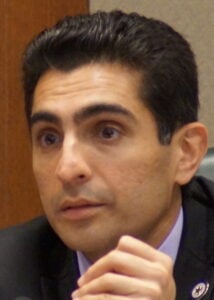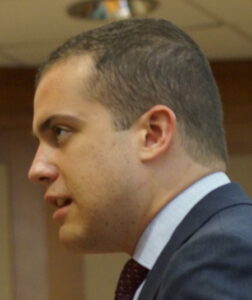State legislators heard testimony Wednesday on a bill that proponents say would eliminate a “loophole” allowing the Austin Transit Partnership (ATP) to borrow billions of dollars without voter approval.
Transit advocates turned up at the hearing by the House Pensions, Investments and Financial Services Committee to oppose the bill. Mayor Kirk Watson, who is on the board of Austin Transit Partnership, a local government corporation created jointly by the City and CapMetro, also weighed in, phoning legislators and issuing a statement slamming the bill as “hugely disrespectful to the voters of Austin.”

House Bill 3899 by Representative Ellen Troxclair (R-Lakeway), who was on the Austin City Council 2015-2018, takes aim at Project Connect’s unusual financing arrangement.
The light rail project depends on a nearly 21 percent share of the city’s maintenance and operations property tax (M&O). Approved by voters in 2020, that tax generated $306 million in revenue in its first two years. Most public infrastructure projects in Texas are financed with bonds and an interest and sinking (I&S) tax that goes away once a project is paid for.
Austin Transit Partnership plans to use its dedicated funding stream to secure the issuance of bonds to cover the large up-front cost of construction and to win federal matching grants worth billions.
Troxclair’s bill would require ATP to go back to the voters again before issuing debt. Otherwise, as a local government corporation, ATP isn’t subject to voter-approval requirements for bond issuance. Troxclair says a city shouldn’t be able to evade the voter-approval requirement for bond issuance by transferring money to a local government corporation.
“It wasn’t illegal, but it wasn’t contemplated in state law,” she said of the arrangement. “This bill simply seeks to close an apparent loophole in state law and clarifies that local government corporations should not have more power to tax and borrow than the cities and counties that created them.”
Project Connect is “the first and only time that we are aware of that this financing mechanism is being used,” Troxclair said. “If we fail to act we would be sanctioning an unprecedented blank-check financing model. And if we do that local governments across the state are likely to use this model to finance capital projects.”
Opponents ‘want a second bite at the apple’

One lawmaker on the House committee pushed back, suggesting Troxclair’s bill was just a bad-faith effort to deny the will of the voters. “I’m concerned about the precedent of local governments and their voters making decisions and then the opponents coming to Austin and getting a second bite at the apple,” said Representative John Bryant (D-Dallas).
Supporters and critics alike agree that Austin voters probably would approve Project Connect again if it were put to a second vote. The result of the tax election in 2020 was a resounding 57.9 percent to 42.1 percent.

Even so, House Bill 3899 could be consequential if passed. One critic of the rail project, former Travis County Commissioner Gerald Daugherty, told the Bulldog that the bill could force the transit agency to curtail its ambitions and scale down the cost. Daugherty led past electoral efforts to defeat light rail proposals, including in 2000 and 2014.
However, subjecting the infrastructure project to another voter referendum could also raise borrowing costs by lowering the perceived creditworthiness of the project, according to transit advocates.

Austin Transit Partnership Executive Director Greg Canally testified that another vote on Project Connect could complicate efforts to secure federal matching funds and would “present risk into the marketplace as we work with the federal government and start working with bond rating agencies.”
Bill faces hurdles
HB 3899 is co-authored by three Republican committee chairmen and has one Democrat co-author, Representative Richard Raymond of Laredo. Its Senate sponsor is the chair of the Senate Local Government Committee, Paul Bettencourt (R-Houston). This gives it the appearance of a priority bill with serious political muscle behind it.
But that doesn’t mean passing HB 3899 will be a slam dunk. It wasn’t even scheduled for a hearing until last week—fairly late into the legislative session. And its author, Troxclair, is a first-term lawmaker, creating a possible vulnerability if the bill makes it out of committee and must compete with other bills for a place on the House calendar. The bill was one of the last on the committee’s lengthy Wednesday agenda because of Troxclair’s lack of seniority.

Committee Chair Giovanni Capriglione (D-Keller) appeared supportive of Troxclair’s bill at Wednesday’s hearing. But his committee is narrowly divided, consisting of five Republicans and four Democrats. Two of the Republican members did not attend the discussion. Two Democrats who attended the hearing expressed doubts about the bill while another two did not express an opinion.
HB 3899 could die on account of opposition, or simply inertia. Under Texas House rules, the last day for the chamber to consider bills on second reading is May 11th. Capriglione left HB 3899 pending without scheduling a committee vote. A source told the Bulldog that the Senate is unlikely to move on the bill until it makes its way through the House.

Another possibility is that the committee could alter the bill to grandfather in ATP’s bond issuing authority while restricting use of the same financing mechanism by other local government corporations in the future. That was a potential compromise raised by Representative Salman Bhojani (D-Euless) in a question he put to Troxclair: “Is any city or county grandfathered if this bill passes? Or would this retroactively affect them?”
Bhojani, a former Euless City Council member, stressed that the Austin City Council had acted within the law at the time and that voters overwhelmingly approved Proposition A. Moreover, he added, investments have already been made to advance the project. “Now to retroactively change the law and apply it to them in that manner—I’m just a little concerned.”
Voters deserve another look?
Witnesses for and against HB 3899 rehashed some of the same ground as the Proposition A election contest, referring to the benefits and downsides of light rail. However, the focus of the discussion was on the Project Connect financing arrangement, the 2020 ballot language, and whether the current project being delivered matches up with what voters were promised.
Opponent of the bill portrayed the 2020 election as giving a clear mandate for Project Connect to issue debt, whereas supporters suggested the proposition was unclear or misleading and didn’t give voters a fair say in how much the debt the project would end up incurring.

Ellen Wood, chair of a political action committee backing HB 3899, Local Politics Matter ATX, said that it wasn’t clear to voters in 2020 that ATP would have “unlimited authority to issue debt with no voter approval.”
“I don’t think that the City of Austin voters were all well-informed to be able to read this ballot and understand what they were voting on. Most voters had no idea,” she said.
Daugherty, the former Travis County Commissioner, said, “It is only right for a community, if you’re going to issue debt and move forward on this project, then every time that you want to issue a tranche of debt, the voters deserve to tell you whether or not they want to move forward with that.”

Likewise, Gonzalo Barrientos, a retired state senator (D-Austin), said that he had doubts about the Project Connect plan and cost when it was submitted to voters in 2020. Now that the plan has changed substantially, voters should have another say before ATP issues debt. “If the price (of the project components) goes up, go back to the people and say it costs this much money, and they say yes or no,” he said.
Others who testified in favor of HB 3899 included former Travis County Auditor Susan Spataro, former Travis County Judge and Tax Collector Bill Aleshire, James Quintero of the Texas Public Policy Foundation, and Mark Nemir, owner of Dirty Martin’s, a restaurant that would be demolished under eminent domain if Project Connect is constructed.
Aleshire called Project Connect a “runaway boondoggle,” saying, “Austin voters are not getting the Project Connect plan, cost, or schedule they were promised in 2020 and was the basis on which voters gave their approval.” (Disclosure: Aleshire represents the Bulldog on public information requests.)
Additionally, more than 30 Austinites submitted written testimony supporting HB 3899. Generally, they complained about Project Connect’s cost and its impact on the already high tax burden in the city. Some said that voters hadn’t been told Project Connect would require debt issuance.
Canally defends ‘will of the voters’
On the other hand, ATP’s executive director pushed back at the idea that a new mandate is needed from the voters, stressing that voters were already told that the Austin Transit Partnership would issue debt.
Canally said, “In the runup to the election I think the idea of this financing mechanism was…a central component of the City of Austin discussion, the dialogue, the debate, and the final decision to put this in front of the Austin voters in November 2020.”
“This construct of using this financing was discussed in numerous presentations beginning in May 2020 all the way up until the election including a published detailed integrated financial model…that laid out the use of the voter-approved bonds along with federal grants.”
Canally further rejected the implication that Project Connect’s financing mechanism was underhanded in any way: “As discussed in the leadup to the election, the Austin Transit Partnership will be using this voter-approved revenue to issue revenue bonds all in compliance with state law. It should be noted that this is an authority of local government corporations to issue these revenue bonds.”
Carol Polumbo, a partner of McCall Parkhurst & Horton LLP, who serves as ATP’s bond counsel, testified as to the legality of ATP’s financing mechanism: “Local government corporations have no taxing authority, and in and of themselves have no revenues. So, it’s not unusual for the sponsoring entities to enter into contracts with the local government corporations and transfer funds to them from various sources, some of which could be ad valorem (property) taxes.”
‘Much needed infrastructure’
Downtown Austin Alliance CEO Dewitt Peart and other Austin business leaders asked lawmakers not to pass HB 3899. Four local chambers of commerce signed on to a letter submitted to lawmakers by Bill McCamley, Executive Director of Transit Forward. “The business communities here in Austin support this project,” he said. “They worry about the consequences of this bill for an extremely important infrastructure project.”
John Langmore, an Austin attorney who formerly served as vice chair of CapMetro, said that HB 3899 “is not about transparency or fiscal conservatism or much less about anything that was illegal. It’s really the attempt to overturn the will of the voters for a mode of transportation that the bill’s author and some of their supporters disagree with.”

“The biggest issue with the bill is that this is an impediment and an awful precedent with respect to delivering much needed infrastructure in Austin and in the State of Texas in general.”
Langmore currently chairs a citizen bond advisory committee for Travis County and was the policy director of the Texas House Transportation Committee in 2003. He warned that the passage of HB 3899 could have “a chilling effect on infrastructure projects across the state.”
In response to a question from Capriglione about the changed scope of the project, Langmore said, “Large-scale infrastructure projects virtually always change in scope and cost, especially now with inflation running as high as it is. That cannot be the basis for a new vote on projects that already have been approved by voters once.”

Alex Meade, representing himself, argued that it was too early to bring the issue back to the polls: “As we’ve evolved as a democracy we’ve realized that there’s a need for balance between on the one hand being able to change our minds and on the other hand being able to make decisions and stick with them and allow people to rely on the decisions that have been made.”
“And that’s my concern with this bill: that it takes us too far in the direction of quickly changing our minds and without being able to rely on the decisions we’ve made,” he said. Austin voters “understood there would be a tax increase, there would be bonds involved, even if it wasn’t a bond proposition. It does seem that this is relitigating the same issue on the ballot even if that’s not precisely what’s happening.”
Trust indicators: Bulldog reporter Daniel Van Oudenaren is a journalist with 13 years experience in local, state, and international reporting.
Correction: This article originally misidentified the witness Alex Meade as a member of the Texas Transportation Commission. He is not.








Thank you for this information. It’s tough for the average Austinite (me) to fully comprehend all the complexities wrapped around PC. It’s frankly beyond tiresome as Austin is constantly picked on by our state legislature with seemingly no concern for doing the complete opposite of their campaign promises.
If Project Connect support remains strong despite the significant scaling back, then there shouldn’t be much of a concern with the Transit Partnership accepting accountability to confirm the ongoing support through a vote every time they need more money… which let’s face it, given their past performance is likely to be the case. Or does accountability not mean what it used to mean?
Most “voters” didn’t understand the intricacies of Project Connect (ProCON), much less its arcane, “house of cards” funding scheme. The words “bond” and “debt” were never used much less debated. The key fact is: Austin voters didn’t vote for bonds and the none of the legally required public bond disclosure, existed on the ballot. Most believed the “record-historic” tax increase with manna from D.C., was paying the tab. Proponents want to re-write history and claim everyone knew they were voting on bonds and billions more in debt; media coverage from the election shows that is false. Be honest, did you believe you were voting on a bond in 2020?
Do we need transparency or a say in how our tax dollars and credit are used? ATP has Bait and Switched the plan with a shadow of what was voted on, raised the cost voters were told by 59%; apparently that’s no problem.
Threatening federal funding and other state infrastructure issues is desperate, unproven fear mongering. There’s no reason to “grandfather” the ATP, they haven’t yet issued any bonds yet.
How is empowering voters to have a say in the debt taken out in their name “disrespectful”, Mr Mayor? Austin homeowners and renters are being had, how many actually use transit in this city? At its essence this bill is about TRANSPARENCY and DEMOCRACY.
Daniel, it was nice to meet you in person. Thank you for hanging in there and covering this. I think you captured a lot of the back and forth that went on.
There was a lot of media explaining that the Project Connect ballot issue was a tax rate election, NOT an approval of a bond. I don’t think voters understood that it would turn out to be both. I also don’t think the voters expected the initial investment to be so drastically reduced compared to what was presented.